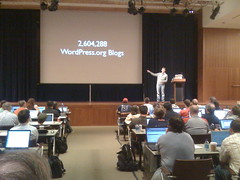WordCamp 2008 happened on Saturday in San Francisco, and it was good.

Highlights were many and often. In no particular order:
Liz Danzico and Jane Wells talked about the great usability work they’re doing for WordPress, and showed off some of the modifications they may or may not make to the current WordPress interface.
Tantek Çelik talked about microformats (and I got to ask him about the box model hack – more on that later).
Stephen Spencer (of NetConcepts, of Madison) provided some interesting tips on search engine optimization that were new to me.
Kathy Sierra (who writes books about Java) gave an amazing presentation that turned my ideas about designing websites upside down. Really! She started out with a trick question: Which testimonial is better: a. “This company kicks ass” or b. “This product kicks ass”? The answer, of course, is c. “I am awesome.” The basic question anyone who makes anything should be asking is, “how can my product make my users be able to kick ass?”
The LOLcats guy, Ben Huh, was there talking about “viral virility”! He made lots of good points that were perhaps overshadowed by the lolcats that illustrated his presentation and distracted everyone with their hilarity.
And of course Matt Mullenweg, founder of WordPress and Automattic, noted that the State of the Word is strong.
(Incidentally, Matt noted that he wants to be the #1 Matt on the web again. [He used to be until some guy who dances for gum, uh, whose site I actually like, took over.] So I’m indulging his wishes by linking to Matt here.)
For way more details, read Andrew Mager’s liveblog of WordCamp 2008. He was one of the people I actually talked to there… a really cool guy who happened to be at Virginia Tech last year and created a powerful community site. He was also the unofficial conference mascot once he applied a temporary WordPress tattoo to his forehead.
Here are a couple of my WordCamp photos (more later).
Note on location: It was held at the Mission Bay Conference Center on the weirdly isolated UCSF campus. (Biking in from BART, it was almost impossible to figure out which building was the conference center… I figured it was the biggest building I could see, and I happened to be right, but none of the permanent campus signage indicated where it was! One would figure that the most people coming to conferences on campus would be the people least likely to know the campus — so why wouldn’t they put the conference center on the permanent maps? Unfathomable.
But overall WordCamp 2008 was a real improvement on WordCamp 2007 (which I also thoroughly enjoyed). The venue was more comfortable in almost every way. Last year, at the Swedish-American Hall, it was really hot, there was no room for all the livebloggers attached to their laptops, there was only one track of talks. This year, the venue (and the food!) was way better and the vast majority of the speakers were informative and interesting.


